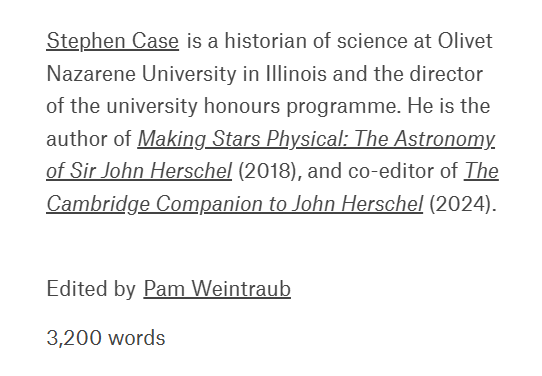Welcome to DU!
The truly grassroots left-of-center political community where regular people, not algorithms, drive the discussions and set the standards.
Join the community:
Create a free account
Support DU (and get rid of ads!):
Become a Star Member
Latest Breaking News
Editorials & Other Articles
General Discussion
The DU Lounge
All Forums
Issue Forums
Culture Forums
Alliance Forums
Region Forums
Support Forums
Help & Search
Naming the Universe

How the quick thinking of internationally minded astronomers avoided stamping the solar system with petty European rivalries
https://aeon.co/essays/how-gods-beat-astronomers-in-the-solar-system-name-game

Planetary System. Eclipse of the Sun. The Moon. The Zodiacal Light. Meteoric Shower. From Yaggy’s Geographical Study, 1887. Courtesy the David Rumsey Map Collection

It was the autumn of 1846, and John Herschel (1792-1871), the British astronomer and natural philosopher, was not sleeping well. He had just put his foot into the century’s most acrimonious astronomical dispute, and now he was being abused by those on both sides of the matter – his British colleagues on the one hand, and French astronomers and their European allies on the other. By the 1840s, Herschel, who was first knighted and later made a baronet by Queen Victoria, was one of the astronomical community’s leading lights. As the son of William Herschel (1738-1822) – the musician-turned-astronomer who had discovered the first planet in recorded history and neatly doubled the size of the solar system – John had inherited his father’s massive telescopes and method of sweeping the night sky for new objects beyond the solar system. He had also inherited and extended his father’s legacy to become the de facto spokesman of Victorian science. John Herschel’s treatise on the scientific life, A Preliminary Discourse on the Study of Natural Philosophy (1830), was a contemporary bestseller, and influenced a generation of thinkers who followed after him, from John Stuart Mill to Charles Darwin. Indeed, as the historian of science Walter F (later Susan Faye) Cannon quipped in 1961, being scientific in the Victorian era meant simply to ‘be as much like [John] Herschel as possible’.
But, for a few weeks in late 1846, even John Herschel didn’t want to be John Herschel. French astronomers had just announced another new planet beyond the one that Herschel Senior had discovered back in 1781. Whereas William Herschel’s planet (known today as Uranus) had been an accidental, serendipitous discovery, the location of this new one had been mathematically predicted by the French astronomer Urbain Le Verrier (1811-77). Shortly thereafter, this prediction was confirmed by observation at the Berlin Observatory on the evening of 23 September 1846. The new planet was the first celestial body detected by mathematical analysis, a stunning achievement for mathematical physics and for Isaac Newton’s gravitational synthesis.

Astronomer Sir John Herschel photographed in 1867 by Julia Margaret Cameron. Courtesy the Met Museum, New York.
Herschel was thrilled by the discovery. However, he, along with a handful of other British astronomers, was also aware that someone else had been working on similar calculations, and that those calculations had come quite close to predicting the new planet’s location, independent of Le Verrier’s work. This person was the shy, retiring Cambridge mathematician John Couch Adams (1819-92). Whereas Le Verrier was renowned in the astronomical community, Adams was almost completely unknown outside of England. Yet, based on Adams’s calculations, the Cambridge Observatory had begun a slow, meticulous search for the new world prior to the announcement of the discovery in Berlin.
The result was that, when Le Verrier announced the successful discovery of the new planet, Herschel felt obliged to speak up publicly for Adams’s work, making the British look like sore losers. Le Verrier and astronomers abroad were rightly indignant, and many in Britain were outraged too, wondering why Adams’s work hadn’t received more attention and possibly beaten the French to it. Herschel found himself in the middle of this brewing storm. The day after reading an angry public response from Le Verrier, Herschel told his friend William Whewell (1794-1866), Master of Trinity College, Cambridge, that he had been up all night drafting a response.
snip